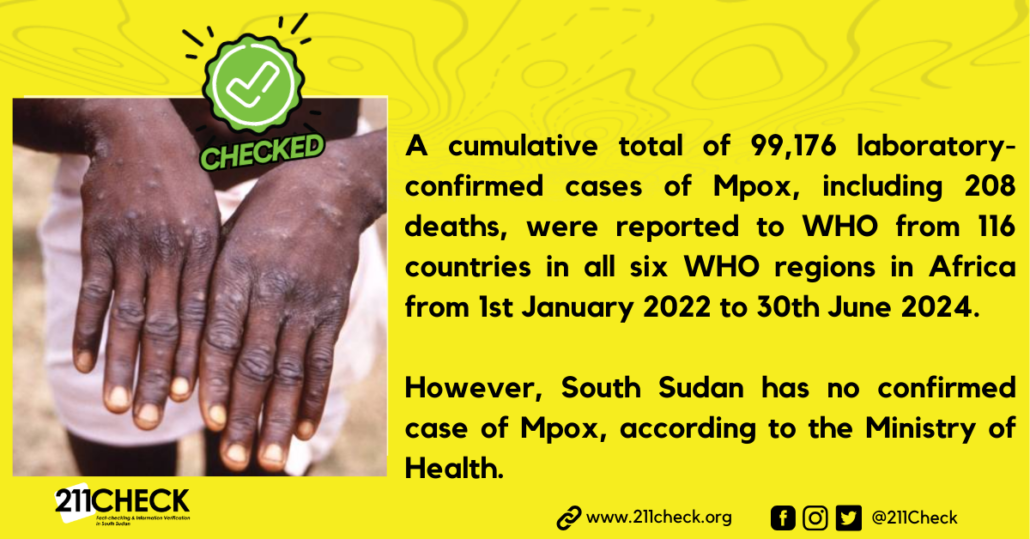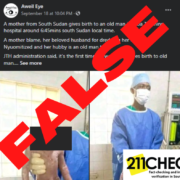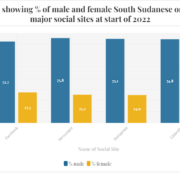Explainer: MonkeyPox, what do you need to know?
A cumulative total of 99,176 laboratory-confirmed cases of Mpox, including 208 deaths, were reported to WHO from 116 countries in all six WHO regions in Africa from January 1st, 2022, to June 30th, 2024. However, South Sudan has no confirmed case of Mpox, according to the Ministry of Health.
Writer: Beatrice Amude Paulino
A media report on August 7th, 2024 by Radio Tamazuj indicated that there were two suspected cases of monkeypox in Aweil town, Northern Bahr-el Ghazal State.
The State Ministry of Health has reported the case, and some samples were taken to the World Health Organisation in Juba, according to Dr. Riing Riing Lual Dau, the Northern Bahr-el Ghazal State Minister of Health.
“We called the lab technicians to take the sample that was booked by WHO to Juba to be confirmed in the main lab. If it is monkeypox, we will inform our community to put in place preventative measures,” said Dr. Riing.
The Getty image indicates monkeypox patience.
211 Check research:
With the recent suspected case of monkeypox, 211check has conducted in-depth research to educate the public.
What is monkeypox?
According to the Centres for Disease Control and Prevention (CDC), mpox (formerly known as monkeypox) is a disease caused by infection with a virus known as the monkeypox virus. This virus is part of the same family virus that causes smallpox.
Mpox is a zoonotic disease, meaning it can be spread between animals and people. It is endemic, or found regularly, in parts of Central and West Africa. The virus that causes monkeypox has been found in small rodents, monkeys, and other mammals that live in these areas.
The World Health Organisation (WHO) says the monkeypox virus is an orthopoxvirus that causes mpox (monkeypox), a disease with symptoms similar to smallpox, although less severe.
While smallpox was eradicated in 1980, mpox continues to occur in countries in central and western Africa.
How does the monkeypox virus transmit?
According to the WHO, Mpox spreads from person to person through close contact with someone who is infected with the monkeypox virus. Close contact includes being face-to-face (such as talking or breathing close to one another, which can generate droplets or short-range aerosols); skin-to-skin (such as touching or vaginal/anal sex); mouth-to-mouth (such as kissing); or mouth-to-skin contact (such as oral sex or kissing the skin).
The CDC indicates that both clades of mpox spread through direct contact with infected wild animals, through close contact, including intimate or sexual contact with a person with mpox, and through contact with contaminated materials.
Similar analyses can also be found here, here, here, and here.
What are the signs and symptoms of monkeypox?
People with mpox often get a rash that may be located on hands, feet, chest, face, or mouth, or near the genitals, including the penis, testicles, labia, vagina, and anus, according to the CDC.
The first symptom of monkeypox is a rash, while others may have different symptoms first. The rash begins as a flat sore, which develops into a blister filled with liquid and may be itchy or painful. As the rash heals, the lesions dry up, crust over, and fall off. Some people may have one or a few skin lesions, and others may have hundreds or more. These can appear anywhere on the body, such as the palms of hands and soles of feet, face, mouth, throat, groin and genital areas, and anus.
Some people also have painful swelling of their rectum or pain and difficulty when peeing.
More information can also be found here.
Besides, the WHO factsheet indicates the signs and symptoms of a person infected with monkeypox usually begin within a week but can start 1 to 21 days after exposure. However, the symptoms typically last 2 to 4 weeks and sometimes longer in someone with a weakened immune system.
How can monkeypox be detected and treated?
According to the Cleveland Clinic, to diagnose mpox, the healthcare provider takes a tissue sample from an open sore (lesion). Then, send it to a lab for polymerase chain reaction (PCR) testing genetic fingerprinting.
In addition to that, the person affected also needs to give a blood sample to check for the monkeypox virus or antibodies the immune system makes.
Currently, there are not any approved antiviral treatments for monkeypox. However, antiviral drugs like cidofovir or tecovirimat may be prescribed to the sick person by a healthcare provider.
How can monkeypox be prevented?
The CDC recommends the JYNNEOS vaccine for the prevention of mpox. Getting both doses provides the best protection. A person should get two doses four weeks apart. Even if it has been longer than 4 weeks since the first vaccine dose, one needs to get the second dose as soon as possible. However, if a Mpox patient previously recovered from mpox, he or she does not need the vaccine.
What are the authorities in South Sudan doing about the recent suspected monkeypox cases?
The Northern Bahr el Ghazal State Ministry of Health has registered two suspected samples that were taken to Uganda for further investigation.
However, according to the report by Radio Tamazuj, Dr. Riing Yak Chan, the Director of Preventive Health Services, said none of the cases has substantively been confirmed as monkeypox but promised to continue monitoring the situation.
In addition to that, the National Ministry of Health, in a press statement on August 19th, 2024 assured the public that South Sudan has no confirmed case of monkeypox.
“The Ministry of Health reassures that there is no confirmed case of Mpox in South Sudan and urges the general public to remain calm but vigilant and report any suspected cases to the nearest health facility or to call the Toll-Free Line 6666,” reads a press statement released by the Ministry of Health.
On the other hand, the Health Ministry encouraged the public to adhere to the following public health preventive measures:
- Avoid close contact with an infected person.
- Use personal protective equipment (PPE) when caring for patients.
- Do not share bedding, clothing, towels, or utensils with sick people.
- Practice hand hygiene and respiratory etiquette.
- Isolate infected patients in hospitals or at home.
- Avoid close contact with wild animals, especially those found sick or dead.
- Cook all foods containing fresh animal meat or products properly before eating.
What is the World Health Organisation saying?
WHO Director-General Dr. Tedros Adhanom Ghebreyesus declared the mpox outbreak a public health emergency of international concern on August 14, 2024. The WHO noted that the declaration makes it easier to speed up the acquisition and implementation of funding, global public health measures, and joint efforts to contain the disease. The WHO advisory on Mpox is found here also.
Conclusion
With the declaration of monkeypox as a public health emergency of international concern by the WHO, South Sudan has no confirmed cases of the disease.
However, the Health Ministry noted that “in the African region, the Democratic Republic of Congo (DRC) recorded the highest number of Mpox cases for the time, with sustained transmission driven by sexual contact. Other countries neighbouring the DRC that have reported Mpox include Burundi, Kenya, Rwanda, and Uganda. Some of these countries closely bordering South Sudan with porous borders and high population movements posed an increased risk of spillover of the monkeypox virus into the country.”
To ensure accuracy and transparency, we at 211 Check welcome corrections from our readers. If you spot an error in this article, please request a correction using this form. Our team will review your request and make the necessary corrections immediately, if any.
Fighting misinformation and disinformation in the media is crucial to avoiding fake news. Don’t share content you’re uncertain about. False information can harm and mislead people, risking their lives—Fact-check before sharing. For more details, visit https://211check.org/ or message us on WhatsApp at +211 917 298 255. #FactsMatter.

 211 Check Website Graphics & Getty Image
211 Check Website Graphics & Getty Image






Leave a Reply
Want to join the discussion?Feel free to contribute!